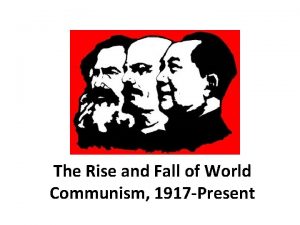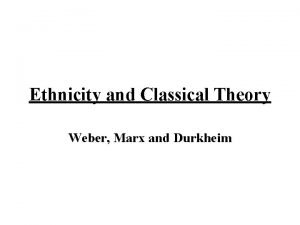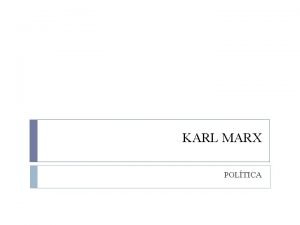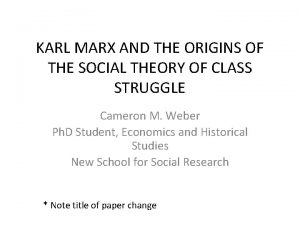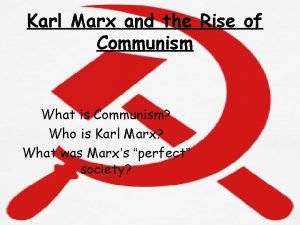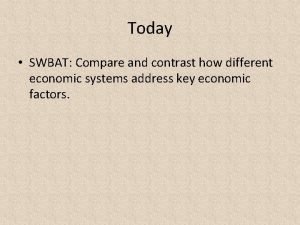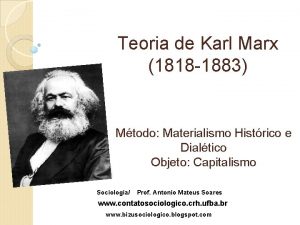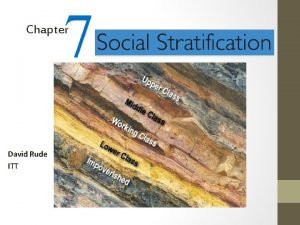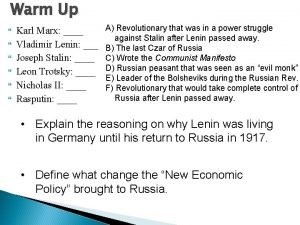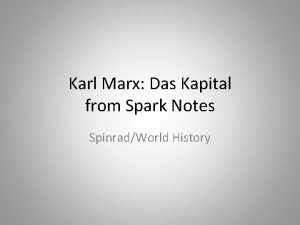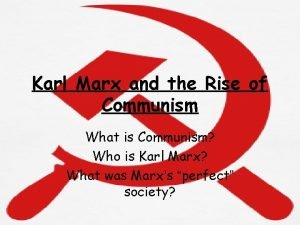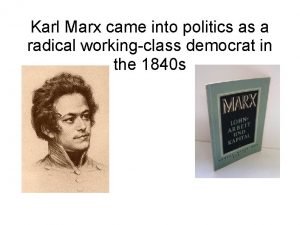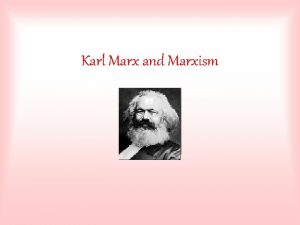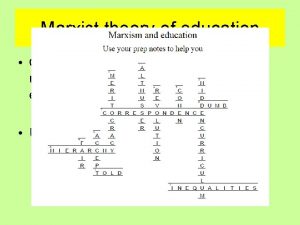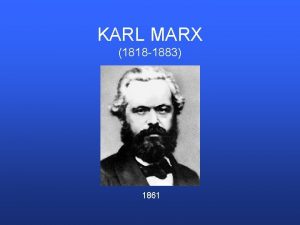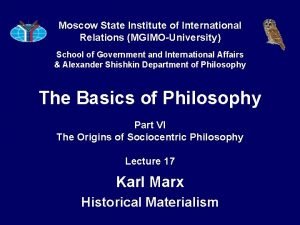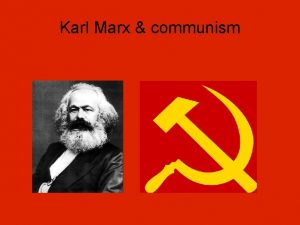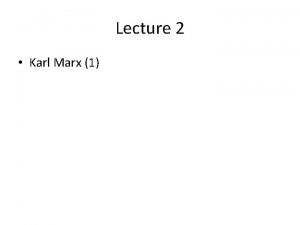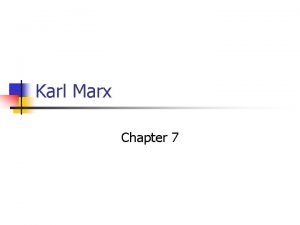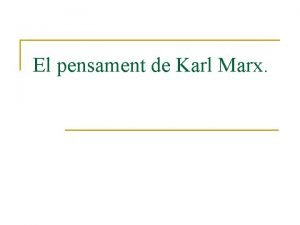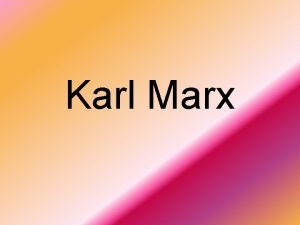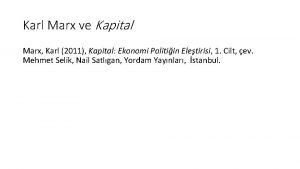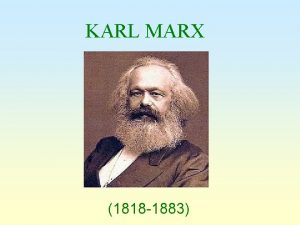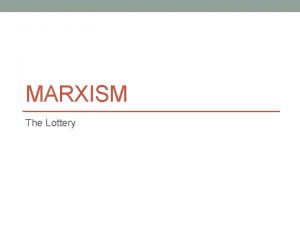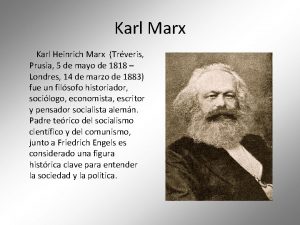Karl Marx The Father of Communism COMMUNISM A





















- Slides: 21

Karl Marx: “The Father of Communism”

COMMUNISM: A Reaction to the “ills” of Industrialization!

Development of the “factory culture”

Stereotype of the Factory Owner

“Upstairs / Downstairs” Life

Socialism According to Marx l Karl Marx- German philosopher, supported the establishment of socialism and communism. l Wrote the “Manifesto of the Communist Party” along with Friedrich Engels. l Marx was unhappy with capitalism and the negative aspects of industrialization (Most significantly, the unfair exploitation of the working class.

What is The Communist Manifesto? l The Communist Manifesto was Marx and Engels’ greatest work l l Published in 1848 Not widely read in Europe until after Marx’s death in 1883 l Marxist “Bible”

Who are the major players in Communism? l Two (2) groups: 1. Proletariat = Working class / lower classes of society 2. Bourgeoisie = Upper classes / the ones who gain wealth off the proletariat

What Needs To Take Place First? l Marx believed that history could be explained through class struggle (Examples: ) l Marx was convinced that history would pass through certain phases (I. E. Feudalism, Capitalism, Socialism) until finally a Communist society would emerge.

Communism After the proletariat has successfully overthrown the bourgeoisie: 1. Communism would gradually emerge. 2. The need for government would no longer exist. 3. There would no longer be separate classes in society. l Everyone would work according to their abilities and… l Everyone receives according to their needs. l

History of Class Struggle

Marx’s Theory? Marx and Engels studied the history of the world’s economies and the way that power, industry and finance are controlled. l They saw the way countries developed in stages over world history l Communism (Marxism) Socialism Capitalism Feudalism Primitive Communism

What is Primitive Communism? Primitive Communism l This is how humans first lived together – in small tribes. l Everything was shared amongst the tribe – food, jobs, belongings. No-one owned land. l Eventually a group comes to power – this leads to Feudalism…

What is Feudalism? • Under feudalism, a king or emperor or chief becomes the ruler over all the people. Feudalism Primitive Communism • The people are kept uneducated and told that God chose the king to rule. The church helps the king this • He gives land privileges to ‘nobles’ who rule the people for him. • As trade develops, some people get richer. This leads to Capitalism…. .

What is Capitalism? • The business owners or capitalists get richer while the workers do all the hard work. • The capitalists get more power to serve their own interests. Feudalism Capitalism • Capitalism creates a huge workingclass of people who soon get angry at the way they are treated. • Eventually they begin to demand changes. This will lead to a revolution and Socialism…

What is Socialism? • The workers take control of the country to produce things for everyone. Capitalism • In the Socialist revolution all the rulers – kings, churches, capitalists are got rid of. • Because nothing is made for profit, all people benefit from education and health. Socialism • These ideas spread across the world to create Communism….

What is Communism (Marxism)? Communism (Marxism) Socialism • As everyone now works together, war is a thing of the past – armies are not needed. • Sharing means no police are needed. • Everything is provided by the people – so money becomes a thing of the past. • All human activity goes towards benefiting each other – allowing all to live their lives to the full.

Communism (Marxism) = “Short Version” Step #2 Step #3 • A “temporary” dictatorship will step in and help to redevelop society (re-build industry, create laws, etc. ) • The “temporary” dictatorship will voluntarily give up power, thus creating a classless, borderless utopia

The Communist “Utopia”

How did Marx / Engels’ work influence European society? l Marx / Engels’ work is going to influence a new generation of revolutionaries Tired of corruption l Desiring a new society l l Marx / Engels’ works are feared by many European leaders l Arrest, imprison, or exile many Communist leaders

Communism Appears Easy, However… l What does it NOT take into account? . . . what is it’s possible flaw?
 Marxism theory
Marxism theory Max weber theory
Max weber theory Karl marx early life
Karl marx early life Neomarxism
Neomarxism Capitalismo marx
Capitalismo marx Conclusion of class struggle by karl marx
Conclusion of class struggle by karl marx Karl marx
Karl marx Karl marx theory of capitalism
Karl marx theory of capitalism Compare and contrast, karl marx and adam smith venn diagram
Compare and contrast, karl marx and adam smith venn diagram Teoria da mais valia
Teoria da mais valia Kingsley davis
Kingsley davis Karl marx consumo
Karl marx consumo Karl marx vladimir lenin and joseph stalin
Karl marx vladimir lenin and joseph stalin Das kapital sparknotes
Das kapital sparknotes Alienação karl marx
Alienação karl marx Marxism vs communism
Marxism vs communism Marx
Marx Karl marx
Karl marx Karl marx 1818 to 1883
Karl marx 1818 to 1883 Karl marx system crossword
Karl marx system crossword Alienação karl marx
Alienação karl marx Karl marx materialist conception of history
Karl marx materialist conception of history
